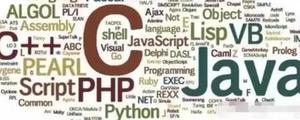可怜的人为C#的“词法分析器”
我试图用C#编写一个非常简单的解析器。
我需要一个词法分析器-一种使我可以将正则表达式与令牌相关联的工具,以便它可以读取正则表达式并返回符号。
看来我应该能够使用Regex进行实际的繁重工作,但是我看不到一种简单的方法。一方面,正则表达式似乎只适用于字符串,而不适用于流(为什么!!!!?)。
基本上,我想实现以下接口:
interface ILexer : IDisposable{
/// <summary>
/// Return true if there are more tokens to read
/// </summary>
bool HasMoreTokens { get; }
/// <summary>
/// The actual contents that matched the token
/// </summary>
string TokenContents { get; }
/// <summary>
/// The particular token in "tokenDefinitions" that was matched (e.g. "STRING", "NUMBER", "OPEN PARENS", "CLOSE PARENS"
/// </summary>
object Token { get; }
/// <summary>
/// Move to the next token
/// </summary>
void Next();
}
interface ILexerFactory
{
/// <summary>
/// Create a Lexer for converting a stream of characters into tokens
/// </summary>
/// <param name="reader">TextReader that supplies the underlying stream</param>
/// <param name="tokenDefinitions">A dictionary from regular expressions to their "token identifers"</param>
/// <returns>The lexer</returns>
ILexer CreateLexer(TextReader reader, IDictionary<string, object> tokenDefinitions);
}
因此,pluz发送了codz …
不,认真的说,我将要开始编写上述接口的实现,但我很难相信在.NET(2.0)中尚没有一些简单的方法可以做到这一点。
那么,对上述简单方法有何建议?(此外,我不需要任何“代码生成器”。性能对此并不重要,并且我也不想在构建过程中引入任何复杂性。)
回答:
我在此处作为答案发布的原始版本存在一个问题,即只有在有多个与当前表达式匹配的“ Regex”时才起作用。也就是说,只有一个Regex匹配时,它将返回令牌-
而大多数人希望Regex是“贪婪的”。对于诸如“引号字符串”之类的情况尤其如此。
正则表达式之上的唯一解决方案是逐行读取输入(这意味着您不能拥有跨越多行的令牌)。我可以忍受-
毕竟,这是一个穷人的词汇!此外,在任何情况下从Lexer中获取行号信息通常都是有用的。
因此,这是一个解决这些问题的新版本。信用也去这
public interface IMatcher{
/// <summary>
/// Return the number of characters that this "regex" or equivalent
/// matches.
/// </summary>
/// <param name="text">The text to be matched</param>
/// <returns>The number of characters that matched</returns>
int Match(string text);
}
sealed class RegexMatcher : IMatcher
{
private readonly Regex regex;
public RegexMatcher(string regex) => this.regex = new Regex(string.Format("^{0}", regex));
public int Match(string text)
{
var m = regex.Match(text);
return m.Success ? m.Length : 0;
}
public override string ToString() => regex.ToString();
}
public sealed class TokenDefinition
{
public readonly IMatcher Matcher;
public readonly object Token;
public TokenDefinition(string regex, object token)
{
this.Matcher = new RegexMatcher(regex);
this.Token = token;
}
}
public sealed class Lexer : IDisposable
{
private readonly TextReader reader;
private readonly TokenDefinition[] tokenDefinitions;
private string lineRemaining;
public Lexer(TextReader reader, TokenDefinition[] tokenDefinitions)
{
this.reader = reader;
this.tokenDefinitions = tokenDefinitions;
nextLine();
}
private void nextLine()
{
do
{
lineRemaining = reader.ReadLine();
++LineNumber;
Position = 0;
} while (lineRemaining != null && lineRemaining.Length == 0);
}
public bool Next()
{
if (lineRemaining == null)
return false;
foreach (var def in tokenDefinitions)
{
var matched = def.Matcher.Match(lineRemaining);
if (matched > 0)
{
Position += matched;
Token = def.Token;
TokenContents = lineRemaining.Substring(0, matched);
lineRemaining = lineRemaining.Substring(matched);
if (lineRemaining.Length == 0)
nextLine();
return true;
}
}
throw new Exception(string.Format("Unable to match against any tokens at line {0} position {1} \"{2}\"",
LineNumber, Position, lineRemaining));
}
public string TokenContents { get; private set; }
public object Token { get; private set; }
public int LineNumber { get; private set; }
public int Position { get; private set; }
public void Dispose() => reader.Dispose();
}
示例程序:
string sample = @"( one (two 456 -43.2 "" \"" quoted"" ))";var defs = new TokenDefinition[]
{
// Thanks to [steven levithan][2] for this great quoted string
// regex
new TokenDefinition(@"([""'])(?:\\\1|.)*?\1", "QUOTED-STRING"),
// Thanks to http://www.regular-expressions.info/floatingpoint.html
new TokenDefinition(@"[-+]?\d*\.\d+([eE][-+]?\d+)?", "FLOAT"),
new TokenDefinition(@"[-+]?\d+", "INT"),
new TokenDefinition(@"#t", "TRUE"),
new TokenDefinition(@"#f", "FALSE"),
new TokenDefinition(@"[*<>\?\-+/A-Za-z->!]+", "SYMBOL"),
new TokenDefinition(@"\.", "DOT"),
new TokenDefinition(@"\(", "LEFT"),
new TokenDefinition(@"\)", "RIGHT"),
new TokenDefinition(@"\s", "SPACE")
};
TextReader r = new StringReader(sample);
Lexer l = new Lexer(r, defs);
while (l.Next())
Console.WriteLine("Token: {0} Contents: {1}", l.Token, l.TokenContents);
输出:
Token: LEFT Contents: (Token: SPACE Contents:
Token: SYMBOL Contents: one
Token: SPACE Contents:
Token: LEFT Contents: (
Token: SYMBOL Contents: two
Token: SPACE Contents:
Token: INT Contents: 456
Token: SPACE Contents:
Token: FLOAT Contents: -43.2
Token: SPACE Contents:
Token: QUOTED-STRING Contents: " \" quoted"
Token: SPACE Contents:
Token: RIGHT Contents: )
Token: RIGHT Contents: )
以上是 可怜的人为C#的“词法分析器” 的全部内容, 来源链接: utcz.com/qa/423478.html







